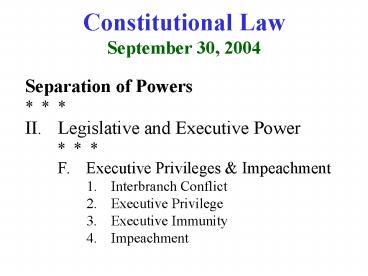Constitutional Law September 30, 2004 PowerPoint PPT Presentation
1 / 15
Title: Constitutional Law September 30, 2004
1
Constitutional LawSeptember 30, 2004
- Separation of Powers
- Legislative and Executive Power
- Executive Privileges Impeachment
- Interbranch Conflict
- Executive Privilege
- Executive Immunity
- Impeachment
2
Recap
- Foreign Relations is Different
- Dominant Federal Interest
- President as Sole Representative
- Independent Presidential Powers
- Symbolic
- Diplomacy Recognition
- Treaties and Agreements
- Commander in Chief
- Executive Agreements
- Prior Cases (Belmont/Pink Dames Moore)
- Ready for Garamendi
3
3. Executive Agreements
- Prior Cases Limited Rationales
- Implicit Congressional Approval
- Independent Presidential Authority
- Garamendi (Holocaust Insurance)
- Scope of power to make agreements (link)
- Preemptive effect
- Related Issues
- Line Between Treaty/Agreement
- Treaty Termination
4
4. War Powers
- Constitutional Division
- Congress Declare War
- President C in C
- Presidential Use of Force
- Repel Invasion
- Suppress Insurrection (Prize Cases)
- Protect citizens and interests
- Armed actions short of war
- Other Congressional Approval (link)
5
d. War Powers Resolution
- Context
- Provisions
- President Reports
- 60/90 Removal
- If Hostilities Imminent
- Unless Congress Approves
- Legislative Veto (concurrent resolution)
- Professes not to authorize use of force
- Ineffective
6
e. Incidental C in C Powers
- The Laws of War
- Field Command (Steel Seizure)
- Enemy Combatants
- Spies and Saboteurs
- Military tribunals (Quirin)
- Independent Presidential Authority?
- Suspension of Rights?
- Hamdi, et al.
7
F. Privileges/Impeachment1. Interbranch Conflict
- Inherent in Separation of Powers
- Extreme Measures
- Prosecution of Legislators/Judges
- Investigation Impeachment
- Privileges Immunities
- Express Congressional P I
- Implied Executive P I
- Implied Judicial
8
2. Executive Privilege
- United States v. Nixon
- Watergate Mitchell Prosecution
- Required production of Tapes
- Beginning of the end for Nixon
- Key Points
- No absolute privilege
- Qualified privilege (candor/ confidentiality)
- Essential functions balancing test
- Application of Balancing
9
c. Application of Balancing
i. United States v. Nixon
Undifferentiated Claim In Camera Review
Core Judicial Function Individual Rights
Need for Privilege
Need for Disclosure
ii. Nixon v. Administrator
W/in Executive Branch Challenge Items
Public Right to Know Congressional Action
Need for Privilege
Need for Disclosure
10
3. Executive Immunity
- Nixon v. Fitzgerald
- Official conduct ?Absolute immunity
- Threat of suit might impact judgment
- Lightning rod for suits
- Clinton v. Jones
- Private conduct pre-office ? No immunity
- Threat of suit wont affect official conduct
- Wont directly interfere with functions
- Lesser officials ?Qualified immunity
11
4. Impeachment
- Process
- House Impeaches (indictment)
- Senate Tries
- Chief Justice Presides
- History
- Presidents
- Judges
- Issues
- High Crimes and Misdemeanors?
- What Kind of Trial?
12
e. The Clinton Case
- Confluence of Decisions
- IC Investigation (Broad Lengthy)
- Immunity (Discovery Perjury Charge)
- Privilege (Disputed)
- Impeached but not Convicted
- Sufficiency of Charges
- Implications for Separation of Powers
13
Legislative/Executive Power
Foreign Affairs
Domestic
Constitutional Authority
War Commerce Consent
Congress
C in C Receive Treaty
Makes Law
Empower Set Standards Procedures
Congress
President
President
Command Represent
Appoint Control Remove
Takes Care
Officers
Officers
Implement
Enforce Administer
14
At a more specific level, our cases have
recognized that the President has authority to
make "executive agreements" with other countries,
requiring no ratification by the Senate or
approval by Congress, this power having been
exercised since the early years of the Republic.
See Dames Moore Pink Belmont . . . . Making
executive agreements to settle claims of American
nationals against foreign governments is a
particularly longstanding practice, the first
example being as early as 1799, when the
Washington administration settled demands against
the Dutch Government by American citizens who
lost their cargo when Dutch privateers overtook
the schooner Wilmington Packet. . . . Given the
fact that the practice goes back over 200 years
to the first Presidential administration, and has
received congressional acquiescence throughout
its history, the conclusion "that the
President's control of foreign relations includes
the settlement of claims is indisputable." Pink,
supra, at 240 (Frankfurter, J., concurring.
Back
15
Back

